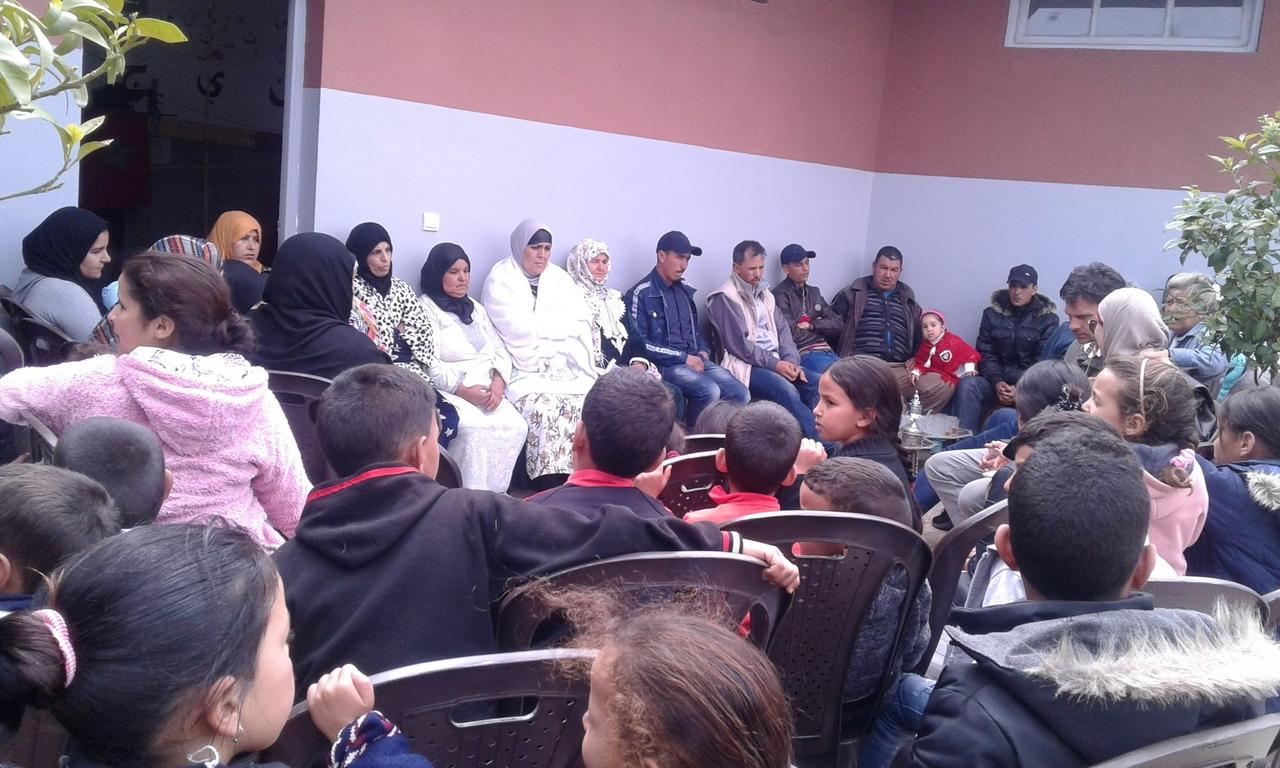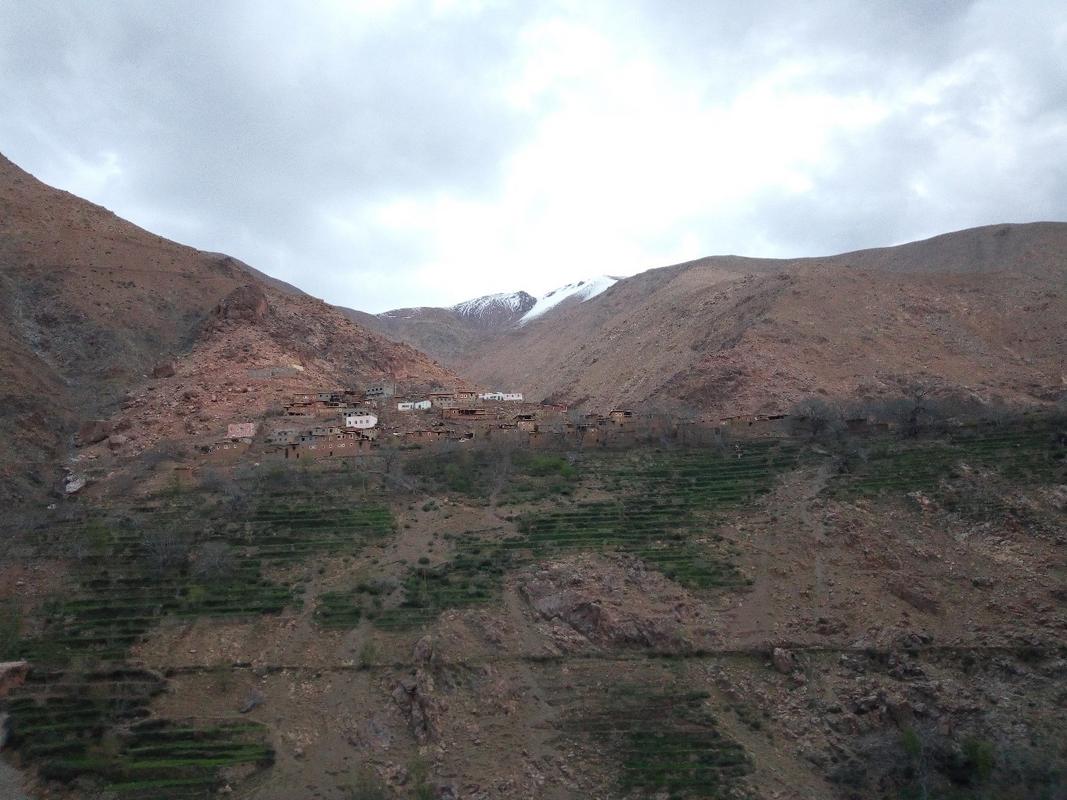Fatima Zahra LAHRIRE
HAF Volunteer
We are now in the Tifnoute Valley of the High Atlas Mountains after a long journey. It was a cold morning, and the snowy mountains reminded of the stormy night of yesterday. It was a crisp and cloudy but the radiant smile upon the faces of the people who came to greet us from early morning was enough to keep us warm. For a moment I didn’t feel at ease. It was hard to imagine myself in their shoes, and it was harder to try and put myself in their shoes. They asked us if we slept well and how was our night. They asked if we felt cold or not. We are not familiar these questions in our daily lives in Marrakech.

After we ate breakfast, we moved to a classroom that is used as an office of a local association. Members of the local population arranged the tables before we arrived, and cleaned the room. The first thing that grabbed my attention was two ropes on a wall. Small stories in Arabic and French were hung as if they were waiting their turn to dry, but unfortunately, the sun of the light does not dare to cross the cold walls. Additionally, on the whiteboard, there was no trace of a lesson but the date of the last session, going back to three weeks ago. We have been told that schools were closed since the beginning of the national strike by teachers forced into contractual teaching started at the beginning of this month. We put the notebooks and pens on the tables and waited for the women to come. The fast wind hitting the open door and the window wasn’t an obstacle for them, neither was it for us as we watched the roads to see if more women were coming.

They were following our movements to the small details. If we spoke with each other they did the same. If we came inside, they came. We started the workshop and we introduced ourselves. Ibtissam Niri, HAF’s empowerment trainer, Mrs. Rachida Oitoichki who is the president of the Aboghlou women’s cooperative in Ourika, and I. Miss. Niri asked the women to introduce themselves and that was the first step. Young women hesitated even before they say their first names and it was difficult for them to talk about themselves. I couldn’t forget one of the girl’s words when she said: “I am not doing anything in my life, I’m just waiting in my home.” They were waiting their turn patiently, to the extent that I thought they were hoping it’s never their turn.
Some of them enjoyed sitting on the tables. They moved towards the women and young women sitting next to them and smiled. Some of them took the notebook, observed it carefully, and turned its pages again and again. Others held the pen in their hands and moved it between their fingers and then moved it to the other hand as if they were trying to remember how they used to write when they were at school a long time ago. There were two women who were older than the other girls. They both did not open the notebook nor held the pen, but watched them curiously and touched them carefully like they are touching a precious object. However, the two women were first to participate and express their opinions in Tamazight because they don’t speak Arabic. The teacher of the village Mrs. Khadija and Mrs. Rachida were interpreting from Arabic into Tamazight and vice versa.
Miss Ibtissam started the workshop with a warm-up activity in the form of a brainstorming exercise. She asked the girls what they think about the word “Tamkine” [empowerment] in Arabic. There was a long silence colder than the weather itself, then chitchatting started. Miss Ibtissam tried hard to paraphrase the question and to invite the women to voice their opinion in their native language. Finally, one of the young women wanted to say something, she said innocently: “We really want to answer but we do not know how to think”. I couldn’t believe my own ears, nor could I believe how the other young women nodded their heads to agree with her. I thought that they were shy or that they were hesitating to speak in front of us because we are strangers but I could never imagine the real reason behind their silence.
Miss Ibtissam tried to simplify as much as she could and then asked teacher Khadija to explain to the women in Tamazight. The women were familiar bit by bit by the axes of the workshop. Before we went to the lunch break, Miss Ibtissam explained to the women an exercise about their vision. She gave an example of the drawing of a clock on the wall far off in front of her, an idea to work toward and reach, to simplify what she meant by the word vision. She gave them white paper and asked them to write or draw their visions and work in groups of three to four young women. Before they started writing, they discussed their visions which are quite similar, and then asked one of them to write something like the other groups. Most of the young women who had been at school were struggling to write the first words. They stopped after two words in order to correct the spelling.
Yeja is the name of one of the young women participating in the workshop. We had lunch in her family’s house and I discussed with her what she wants to do in her life. She was sure that she wanted to continue her studies. She stopped when she finished primary school because there were no secondary elementary schools in the region back then. She wants to be independent and to leave the village to get educated because education is the only way to make her dreams come true. I encouraged her to share her vision with the other women and that was what she did. She was hesitant at first but when she saw that no other young women wanted to share their visions, she volunteered to be the first.
The other women followed carefully every step to answer the first questions that Miss Ibtissam explained beforehand on the board. Yeja stood up next to the board and tried to answer each question from her point of view and at the end, she made a statement in front of us all. Teacher Khadija wanted to do the same exercise and she followed the same steps as Yeja. When she was asking one of the questions, she expressed her sincere intention and will to help the young women get educated and in return, all she asked is their help and commitment.

We finished the day’s workshop and we left all the young women to think about their statements. They were reluctant to leave the classroom. They waited for us in front of the classroom and kept us company until we arrived at the house of the family hosting us. After two hours they came back and joined us in the room where we were sitting. What I admired the most is that they really enjoyed our company and we did the same. Some do not speak Arabic; however, they were listening to us actively and asking their friends to translate for them from time to time.
They did not talk even after the distance they walked and the mountains they climbed to reach us. they couldn’t express their feelings to us but they taught us that much of the meaning must be inferred from the context. I was glad to spend the last hours before sleep with such beautiful souls.
Give to this project.







